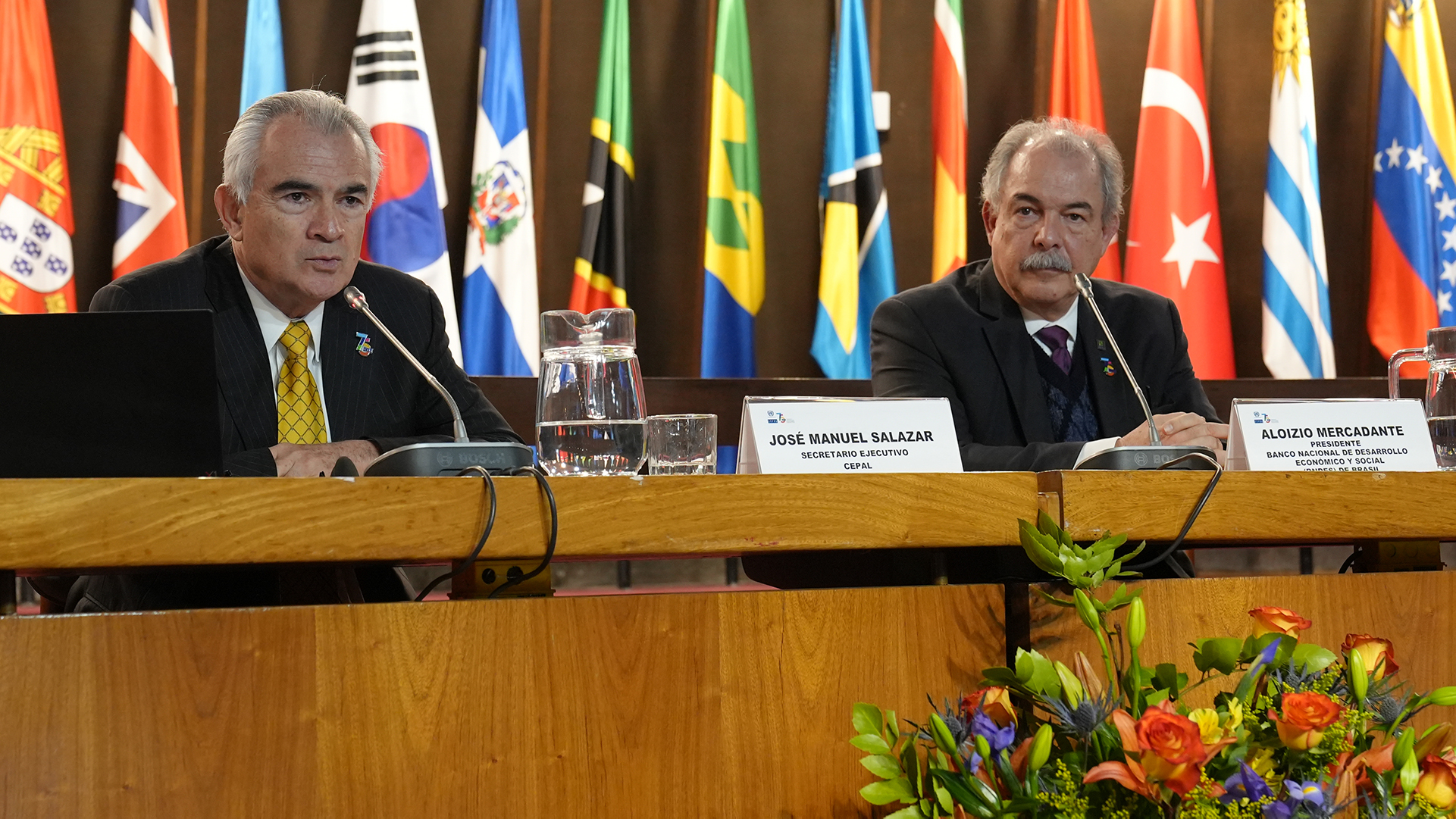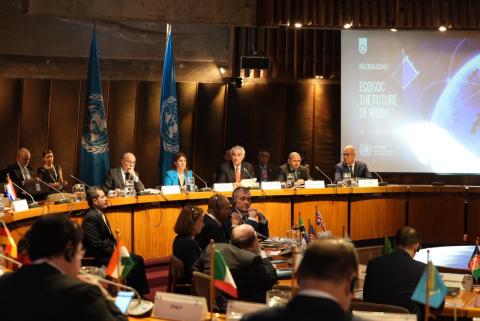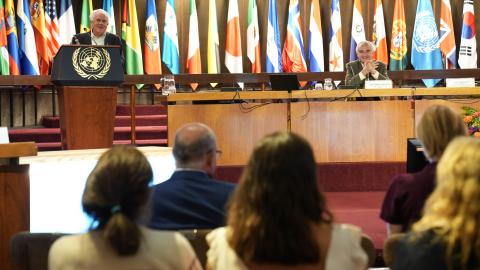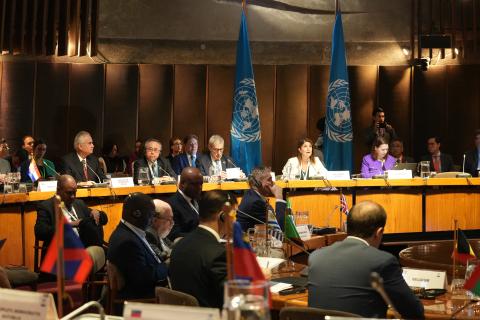News
Latin America and the Caribbean must act with “courage” to reactivate and accelerate regional integration, putting the focus on the necessary decarbonization of the region’s economies to tackle the severe climate crisis, Aloizio Mercadante, President of the Brazilian Development Bank (BNDES), underscored during a keynote lecture he gave at ECLAC’s main headquarters in Santiago, Chile.
The Brazilian economist, politician and scholar made a presentation entitled “The role of development banks in transforming the Latin American development model,” the third such address in the Keynote Lecture Series organized to commemorate ECLAC’s 75th anniversary. He was received by the United Nations regional commission’s Executive Secretary, José Manuel Salazar-Xirinachs.
“We must reposition Latin America on the international stage. We are facing a major geopolitical shift, a polarization between East and West, between the United States and China. The region, in this scenario, must continue to actively pursue a multipolar world. Latin America needs to build bridges, pursuing interactions among the countries of the Global South,” said Mercadante, who has been serving as the BNDES’s 39th President since February, appointed by President Luiz Inácio Lula da Silva.
In his presentation, Aloizio Mercadante reviewed the pillars of the Brazilian government’s current economic policy, which include a new industrial policy, a program to accelerate growth and the ecological transformation, which he described as initiatives for moving towards a green, decarbonized economy.
“This is part of a historic effort. Brazil is living through a new time and it is very positive, but this only makes sense if it is shared with the other countries of Latin America and the Caribbean,” he emphasized.
“Together we have greater diplomatic presence and a bigger, more powerful consumer market. But the integration agenda must be revised,” he acknowledged. “We must integrate the region’s value chains, generate partnerships between companies. We need to intensify infrastructure to accelerate the region’s economic and trade integration.”
“Brazil already produces lithium batteries. Why don’t we reach a joint agreement with Chile, Argentina and Bolivia, which have large lithium reserves, to export these batteries, and not just raw material?” he cited as an example. “Our challenge in the region is not to replace the commodities we export, but instead to create value added.”
In his remarks, Mercadante called on the G20 – the presidency of which Brazil will take over as of December 1 – to prioritize climate action, and he analyzed the role that national development banks can and should play in areas such as reindustrialization, innovation, digital development, the energy transition and fighting the climate crisis, to name a few. The BNDES, he said, is creating innovative financial instruments and establishing partnerships with other public banks and regional institutions.
The Brazilian economist also recognized ECLAC’s historical contributions and expressed confidence that the United Nations regional organization can support the region on the numerous challenges it faces today. “ECLAC has always been a crucial, structuralist and innovative point of reference on development, combining economic development and the fight against inequality in our region,” he stated. “Brazil needs a lot from ECLAC and ECLAC also needs Brazil.”
José Manuel Salazar-Xirinachs, meanwhile, thanked Mercadante for participating in the Keynote Lecture Series and highlighted the long and fruitful relationship between ECLAC and the BNDES, recalling especially the importance of influential Brazilian economist Celso Furtado.
“Celso Furtado, who would have turned 103 this year, was one of the founders of what is known as the ECLAC school of thought on Latin America and the Caribbean’s development, and he also formed part of the BNDES as a director in the 1950s,” ECLAC’s Executive Secretary noted. In Brazil, Furtado led the ECLAC-BNDES Joint Study Group, which was active from 1953 to 1955.
In the context of Mercadante’s visit, the two institutions signed a memorandum of understanding that, among other things, formalizes the creation of a new joint Working Group, named after Celso Furtado, with the aim of promoting academic research, the publication of studies, and training on key issues for the development of the Brazilian, Latin American and Caribbean economies.
“This Working Group recovers, 70 years later, a historical framework for action and initiatives for economic development, with the new challenges and complexities that the 21st century poses for creating a more productive, inclusive and sustainable future,” Salazar-Xirinachs explained.
According to ECLAC’s highest authority, “Brazil and the countries of Latin America and the Caribbean are at a crossroads: despite these countries’ enormous potential, growth rates in the last decade have been very low, creating an environment in which the structural gaps in development tend to worsen.”
“The big push that we must make on multiple fronts – productive, social, environmental, digital, educational and on the care society – to transform our development models requires scaling up financing, and few institutions in the world have as much experience with this issue as the BNDES,” Salazar-Xirinachs affirmed.
Development banks, he emphasized, are called upon to play a central role in financing the transformations of our development models and the respective structural changes. Without massive investment, there will be no structural change to a more productive, inclusive and sustainable development model, nor will there be transitions to accelerate the pace for achieving the 2030 Agenda’s Sustainable Development Goals (SDGs), he indicated.
The Keynote Lecture Series began on July 24 with a presentation by Arancha González Laya, Dean of the Paris School of International Affairs (PSIA) at the Paris Institute of Political Studies (Sciences Po), while August 18 marked the turn of renowned Colombian economist and former ECLAC Executive Secretary, José Antonio Ocampo. In this series taking place through February 2024, other prominent thinkers will visit the Commission’s headquarters in Santiago to present their views and ideas about the challenges facing the world and the region. The full list of lecturers is available here.



